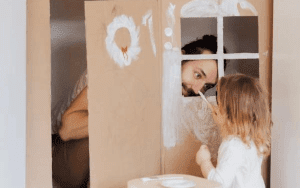- Am I A Good Parent or Bad? Here Are Some Concerns Every Parent Ought to Ponder

Am I A Good Parent or Bad?
Am I A Good Parent or Bad? This is a common question that should be asked every parent from themselves. To examine your efficiency, we have some criteria.
Parenting is a labour of love that pays off in the end. It’s normal for parents (especially new parents) to feel stressed and worn out from all they have on their plates.
Each and every one of us wants what’s best for our kids. Parents might get so preoccupied with making their children happy that they’ll go to any lengths to make their wishes come true.
Parenting is a marathon, not a sprint, and parents must prepare themselves accordingly.
Parenting requires a lot of patience on their part. Parents should examine their character flaws before berating their children for doing anything they disapprove of.
11 Top-Rated Sunscreens for Your Whole Body on Amazon
One of the most challenging professions in the world is being a parent.
Being a parent is a never-ending job; no one will ever be good enough. However, by asking yourself these essential questions, you may improve as a parent.
1. What Do I Want to Achieve as a Parent?
Being a good parent takes time and practice. Setting and revisiting parenting objectives is the first step towards becoming a good parent. Each parent has their own unique set of priorities as a parent. Consider how you’d like to grow as a parent while you make these plans.
How often do you find yourself raising your voice?
Do you have a short temper?
Do you wish more time to invest in your family and children?
- Setting parenting objectives will be less of a challenge once you have a firm grasp on what it is you want to alter, enhance, or modify.
- Make a schedule for yourself to achieve small wins every day. Become the kind of parent you aspire to be before you start trying to change your child’s behaviour.
Answer these questions by answering the most critical questions in your parenting philosophy.
- Exactly what sort of parent would you say that you are?
- Do you like to exercise strict discipline and authority over your child, or would you rather they have a carefree childhood filled with happy, formative experiences?
- How high up on your list of priorities is being a parent?
While these are just a few questions to get you started, there are certainly others you should ask yourself. If you want to raise healthy, happy children, this exercise will help you determine your goals.
Tips for Keeping Seniors Safe From Scammers
It will help strike a healthy balance between parenthood and other essential aspects of your life.
For, tackling challenging parenting issues could be near the top of your priorities. It should include your focus on developing yourself personally. So, prioritise your own health and happiness.
2 As a Parent, Am I a Role Model For My Child Regarding Behaviour and Character Traits?


Parents are the first and most influential teachers of the child. You are setting an example for your children, so watch what you say and how you behave around them. The best way to instil good manners and ethical behaviour in your children is to set a good example yourself.
Treating others respectfully is a great way to teach children to do the same. Be truthful yourself if you expect your youngster to do the same. Suppose you expect a specific behaviour from your child but don’t model it for them. In that case, you may alienate them without even realising it.
- Take a hard look at your connection with your kid –
- Is it one of contention, dominance, or mutual respect and tolerance?
- Do you take the time to bond with your kid?
- Do they anticipate spending time with you?
- Is spending time with your kid something you look forward to, or would you rather be doing something else?
Strive to develop a close bond with your kid. Honour their one-of-a-kind character and listen carefully to what they have to say. Learn your children’s strengths and weaknesses by observing them closely. As your children get older and you encounter difficulty with them, the links and connections you share will help you get through it.
3. How Often Do I Compliment My Kid?
The mind of a youngster is like wet cement; whatever strikes it leaves an indelible mark. The words you use to communicate with your child daily profoundly affect their personality and outlook.
Encourage your youngster by saying kind words daily; you will help them feel loved and supported. Reassure them that you think highly of them and trust in their talents. Reassure your kids that you will be there for them no matter what.
Children should place the most importance on their parents as role models. This begs the question:
What kind of example am I setting for my kid?
Do I take on the values and principles that are important to me?
Consider carefully whether or not your children are picking up bad habits from you, such as dishonesty, violence, or filthy language. After all, kids often pick up their parents’ bad habits and outlooks.
Therefore, if you want your child to grow up to be a decent person, you should lead by example by demonstrating strong morals and social skills, building meaningful relationships, maintaining high but reasonable expectations, demonstrating strong work ethics, and growing from your own mistakes.
4. Do I Recognise and Admit My Errors?
Everyone is wrong sometimes. There is no shame in admitting you were wrong. Keep in mind that many young people prefer a level playing field. When you don’t take responsibility for your actions, you teach others to do the same.
Despite your fears that your kids will see you as weak if you apologise, consider the lesson you’ll teach them if you don’t. Children learn humility and the ability to make amends when their parents are willing to do the same. If your kids are willing to learn from their errors, they will be able to hone their abilities.
5, What Should I Say or Do When My Child is Struggling?


Every parent faces challenging circumstances. How do you get through difficult times?
When feeling overwhelmed or angry, do you lash out at your kid with harsh words and physical punishment?
Is your concern about social disgrace keeping you from resolving the underlying problem?
How do you comfort your child when he or she is feeling down?
Instead of constantly dwelling on the negative, consider whether you are giving your child the positive reinforcement they need. Try to respond constructively when your kids mess up by explaining what they did wrong.
They can apply this knowledge the next time they face a similar circumstance. Inspire them to grow and become better through words of support.
Learn How To Keep Your Students Engaged
6. What Do I Find Most Frustrating About Being a Parent, and What Can I Do to Improve My Attitude?
Being a parent is quite challenging. Dealing with the stresses and difficulties of parenthood is always complex. So, you may be wondering,
“What about being a parent that I dislike the most?”
Don’t sugarcoat the difficulties you’re having as a parent.
- Do they make you a less effective parent?
- If that’s the case, how might you alter your perspective?
Share your concerns with a friend who can offer advice or a spouse who can assist in dividing up the work. Try to be something other than the ideal parent since that’s impossible and will leave you empty and unsatisfied.
But if your concerns as a parent are getting in the way of your daily life or making you feel down, it may be time to talk to a professional. Being a parent is an ongoing adventure.
Your love and involvement in your children’s lives will not end just because they are adults. You can keep asking yourself such questions to keep up with modern developments.
Amazon is Still Trying to Crack the Physical Grocery Code.
7. Can I Trust My Children?
How well do you know your children?
Can you describe their preferences?
Have you talked to them recently about things that they’re into?
Interests emerge early on in a child’s development. Communicate with your kid on a deep and meaningful level. Instead of projecting your desires onto your child, try to understand what motivates them so that you can help them pursue their interests.
Remember that everyone can succeed momentarily if they know and do the right things. Your child’s permanent success will be determined by who they are.
8. Am I Good at Creating Memories with My Kid?


Many parents today cannot provide their children meaningful time together since their job responsibilities precede their personal responsibilities. Kids who value themselves highly spend a lot of time with their parents.
They are more likely to develop into emotionally and cognitively healthy adults with fewer behavioral difficulties. Do not let a chance to bond with your children go away.
Hang out with them and do dumb things like watch their favorite TV shows or play games. Though you may sometimes feel silly, remember that the memories you make today will remain with you forever.
We must ask ourselves this crucial question since it’s easy to get bogged down in our daily tasks. Both your profession and your child require your complete focus and energy.
Engage in conversation, play, and education with them. Set aside time to talk to your kids and genuinely listen to them.
What is Bipolar II Depression? Psychopharmacologic Treatment of Bipolar II Depression
9. Do I Use Love When Correcting My Children?
We must make it obvious to children that we do not approve of their behavior by correcting them when required. Instead of ending a reprimand by seeming irritated and annoyed, tell your children you love them.
10. Why Should I Care If My Child Succeeds?
The accomplishments of one’s offspring are often used as yardsticks by proud parents. They will consider themselves successful parents once their offspring live up to their lofty standards.
When parents impose narrow achievement standards on their children, they do so frequently unwittingly to stunt their development. Successful parents are noticeable.
They don’t force their values and ideas on their children or tell them how to define success; instead, they encourage their children to find their own way.
The Reality of Abusers, Abuse, and What to Do
11. What Should I Say to My Kid?


What their parents think of them often shapes who they become. The best parents are aware of this. Even when they make a mistake, they tread carefully in their interactions with them so as not to damage their sense of self-worth.
Instead of saying things like, “I’m disappointed in you,” “I’m ashamed of you,” or “You are a bad/dishonest child,” a parent should remind their child that everyone thinks they’re honest and that this behavior was not expected of them if they were found stealing.
Intelligent parents know their children must have their own intrinsic motivation to succeed. They get that exceptional kids resolve to be exceptional sometimes in their lives.
This is why responsible parents give their kids some leeway when making decisions. The answers to these questions are crucial to bring up happy, successful children.
Raising terrific kids who aren’t permanently angry, frustrated, or overwhelmed is possible if you follow these steps. You can use this assessment’s results to modify your parenting approach.
You and your partner can discuss and coordinate how to best adjust your parenting strategies. Even if you don’t solve every problem, How much do you spend valuable and quality time with your loved ones?
12. Do I Give My Child My Full, Undivided Attention?
Wise parents are there to cheer their kids on even when they fall short. Words like “you can do it,” “I believe in you,” “I love you,” “I’m sorry,” “thank you,” “I’m proud of you,” and “I love you” are common.
13. Have I Fully Internalized My Role?
Most parents believe it is their job to ensure their children have a good education, instruct them in suitable social manners, and mold them into decent adults. However, parents should realize that the most important thing they can do is provide their kids a loving and stable home environment.
14. Do I Provide An Excellent Example for Them?
Both parents and children model their behavior after that of their role models. Intelligent parents inspire their children to follow in their footsteps and become responsible and accomplished adults.
visit blogkingworld.com for further readings,




